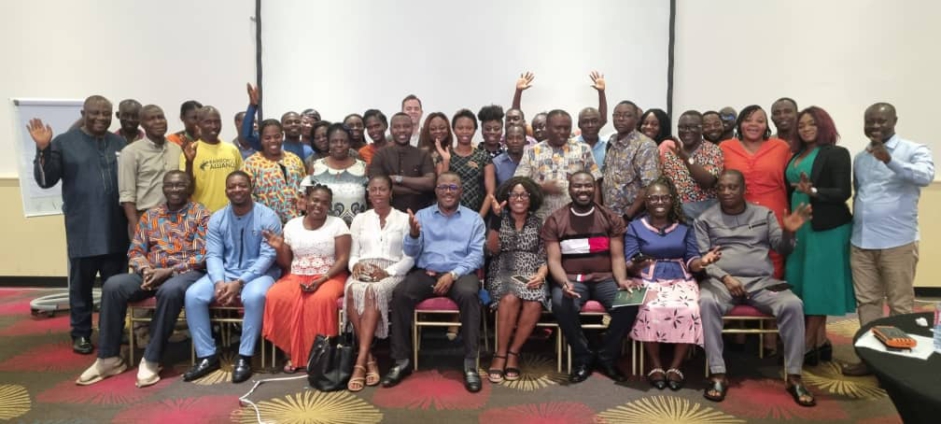The Rainforest Alliance, an international NGO is supporting cocoa companies, traders, cooperatives, farmer groups and gold associations to implement measures that will help to prevent, identify and address forced labour and child labour in their daily operations across the globe.
The organisation as part of their “Yen Ne Mmofra No Nti” project has introduced a Tool called the Human Rights Due Diligence Toolkit prepared for cocoa cooperatives, mining firms, gold associations, and groups operating in the cocoa and gold sectors of Ghana, Côte d'Ivoire and globally.
The tool will provide relevant information on the nature and impact of human rights issues including child labour, forced labour and gender discrimination in the cocoa sector, as well as the legal frameworks and internationally recognized standards that govern cocoa and gold mining.
Workshop
Speaking at a validation workshop held in Accra on the Tool, Country Director for Rainforest Alliance, Ghana/Nigeria, Kwame Osei Boateng mentioned that an estimated 1.56 million children are in child labour in Côte d'Ivoire and Ghana.
According to him, studies show that most of the children who work on cocoa farms do so within their household or extended family.
“Child labour is a complex issue which needs all expertise to come on board to help tackle it head on. Our challenge is that the sector is stricken with poverty and hence culminated in many difficulties at the farmer level.
“I believe that we are all in this together and by completing this tool, implementing and scaling it up, it will go a long way to reduce the incidence of child labour and bring cases to its lowest level” he said.
Senior Project Manager, Joyce Poku-Marboah explained that the involvement of relevant stakeholders is highly beneficial.
She indicated that while it makes them feel valued and involved, it allows for buy-in of the tool and most importantly gathering direct feedback from those who will use it.
She further stated that one of the objectives is to ensure the uptake of the gender-sensitive HRDD tool in 120 selected cocoa cooperatives, companies, and gold mining associations covering over 300,000 members by the end of 2024.
“The Rainforest Alliance with funding from NORAD, and implementing partners; International Cocoa Initiative and Solidaridad Ghana want to increase awareness, engagement and socio-economic resilience of 12,500 vulnerable individuals including, children, youth, women and men.
“The outcome of this project will be that the Ghanaian government at a district, regional and national level will implement measures to prevent, identify, and address forced labour and to protect vulnerable groups” she mentioned.
Overview
A consultant for the Yen Ne Mmofra No Nti project, Dr. Albert Arhin in his presentation explained that the Tool is a comprehensive framework that enables companies, cooperatives, and organisations to identify, prevent, mitigate, and account for potential and actual human rights impacts within their operations and supply chains.
According to him, it uses a systematic and proactive approach to assess, address, and monitor human rights risks and violations.
Dr. Arhin explained that the primary goal of the tool is to ensure that organisations respect and promote human rights, as outlined in internationally recognized standards, such as the Universal Declaration of Human Rights and the International Labour Organisation's core conventions.
“Let me state that the key elements of a Human Rights Due Diligence system (HRDD) typically are Commitment, Risk Assessment and Mitigation, Grievance Mechanism, Remediation, Monitoring and Evaluation and lastly Communication and Reporting.
“Once you follow this process, you are 100% sure organisations can identify and address human rights risks, improve supply chain practices, enhance social and environmental sustainability, and uphold their responsibilities to respect human rights,” he said.
Appreciation
The participants were grateful to Rainforest Alliance for introducing this new HRDD tool to them and their farmer organisations.
“We are excited that this tool provides guidance on communicating HRDD activities and producing annual reports to engage stakeholders. It will set the platform for meeting the EU HRDD Directive. ”
“We have learnt that the tool provides guidance on communicating HRDD activities and producing annual reports to engage stakeholders, demonstrate accountability, and foster trust” said Council Chairman of Cocoa Abrabopa Association (CAA), Ismail Pomasi.
Latest Stories
-
Trump calls US strikes on Iran’s nuclear facilities ‘spectacular success’
3 minutes -
Asantehene’s son to chart future in Astronomy at Wesleyan University
17 minutes -
Mpox crisis: 71% of cases concentrated in Western Region
42 minutes -
FIFPRO condemns Geremi Njitap ban, urges FIFA and CAF to act
1 hour -
Samuel Eto’o bans former teammate Geremi Njitap for five years
2 hours -
Police arrest 8 at Ayanfuri over galamsey, illicit drugs
3 hours -
Ghana Immigration Service issues warning on fraudulent recruitment schemes
4 hours -
NPA proposes tougher punishment to crack down on illegal fuel stations
4 hours -
Martin Kpebu rallies youth to take over the country
5 hours -
The 2026 NPP Presidential Primary
5 hours -
Trump announces air strikes on three nuclear sites in Iran
7 hours -
TESCON SD Dombo University condemns Stephen Amoah’s religious comment
7 hours -
Former SWAG President Ackah passes on
9 hours -
Maison Yusif unveils 2 new fragrances, opens flagship store in Accra
9 hours -
GOC, NSA commemorate International Olympic Day in Accra
9 hours

